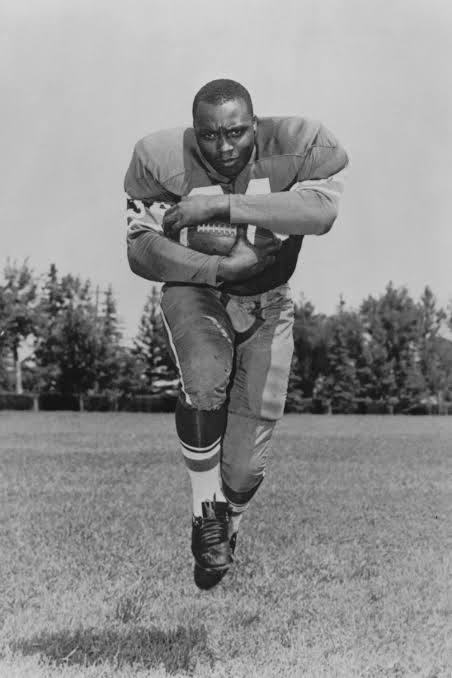Remembering George Reed: His Story
George Reed: October 2, 1939 – October 1, 2023
By Tom Fuzesy
George Reed was born in Vicksburg, Mississippi on October 2, 1939. Reed played college football at Washington State University (alongside future Saskatchewan Roughrider star receiver Hugh Campbell!). Undersized for the NFL, and with CFL salaries as good (if not better) than NFL salaries at the time, he signed with the Saskatchewan Roughriders as a running back in 1963. Reed made an immediate impact as a powerful fullback and was an instant fan favourite: he was voted Most Popular Player in his first year.
In a two-game total point Western Semi Final against Calgary, the Riders first lost 35-9. In the second game, however, they came back, scoring 39-12, and won the series at 48-47, a coup which has been called “The Little Miracle of Taylor Field”. George Reed was the hero of this game, scoring the winning touchdown from 10 yards out with only three minutes left.
Reed kept improving, too: in 1963 he rushed 751 yards on 173 carries. In 1964 it was 1,012 years on 185 carries, and in 1965 it was 1,768 yards on 274 carries for an amazing 6.5 yards a carry. He averaged 111 yards on 17 carries per game. On Oct 24, 1965, Reed rushed for 268 yards in a Rider 30-14 victory over BC, clinching a playoff spot. It was the CFL’s second-best rushing performance in a single game (behind Ron Stewart’s 287 yards in 1960). Reed was the first Roughrider to win the Schenley Award for Most Outstanding Player in the CFL in 1965.
After making it to, but not through, the playoffs four years in a row, in 1966 the Roughriders defeated Winnipeg in two straight games, putting them in the Grey Cup game for the first time since 1951. Their final hurdle was the Ottawa Rough Riders.
Ottawa scored the first touchdown, but Saskatchewan came back to tie the game. In the 4th quarter, SK scored two touchdowns, winning the game 29-14. Saskatchewan’s first Grey Cup win! George Reed, of course, scored the last touchdown on a 31-yard run. In total, he rushed 23 times, for 133 yards. He was voted MVP that game.
1967-1969 were very successful times for George Reed and the Riders. Reed rushed for well over 1,000 yards every year through 1969, was named to the CFL all-star team every year from 1965-1969 and was runner-up to the league’s Most Outstanding Player award in 1968 and 1969. Saskatchewan, and Canada, loved the man with the heart and the talent.
The Riders had 37 wins, 10 losses and one tie from 1967-1969. In the 1967 Grey Cup, they lost 24-1 against Hamilton. In the leadup to that game, the Riders had played four playoff games, including three in eight days for the ‘best of three’ Western conference final, while Hamilton had only played two playoff games in the Eastern conference final, resulting in a tired Riders lineup. In 1969, they lost the Grey Cup once again, 29-11 against Ottawa – Ottawa had simply outplayed them in that game.
1969 marked the eighth consecutive year of making the playoffs, and making the Grey Cup for three out of the previous four years. Their success was a team success but George Reed was a very critical component. His powerful running style made him the best fullback in the CFL.
As the 1970s dawned, George Reed and the Saskatchewan Roughriders were achieving a significant amount of success, having won at least 12 games out of 16 in each of their previous three seasons. The future certainly looked bright, and they won 14 of 16 games in their 1970 season.
Unfortunately, Reed suffered a knee injury in Ottawa on Aug 11, 1970. Initially diagnosed as a bad bruise, he was only out for a single game. As he continued playing, however, it became clear that his knee was not getting better, and it was X-rayed. Two months after the initial injury, Reed discovered he had fractured his tibia — and played eight games on a broken leg. Doctors put him in a cast, and he was put on a 30-day injury list.
Reed returned to play for the best of three western final playoffs against Calgary. Although the Riders went in with a 14-2 season, they lost twice to Calgary. The deciding game was lost 14-12 on a bitterly cold day in Regina. Reed, still rehabilitating his knee, was not in top form.
In 1971, Reed returned with a healthy knee and continued his scorching pace, becoming a CFL all-star once again and retaining the honour through 1974. In 1972, he became president of the CFL Players Association—the first American to hold the title. One of his first goals was to increase the number of Canadians playing in the CFL.
1972 was also George Reed’s final Grey Cup appearance. The Riders got there with a heart-stopping, last-second field goal giving them a 27-24 come-back win over Winnipeg in the western final. Without a doubt, Reed’s 156 rushing yards and two touchdowns helped the Riders storm back after being down 24-7 in the 3rd quarter.
The Grey Cup was a less stellar affair for Reed: Hamilton won 13-10 in a snooze of a game.
Reed’s 1973 season was particularly memorable. In an August 20th game against Ottawa, he rushed 81 yards, helping bring Saskatchewan an 18-12 victory. More importantly, those 81 yards secured him the pro-football all-time rushing record, beating the previous record holder (Jim Brown, of the NFL’s Cleveland Browns) by a single yard. With 12,312 rushing yards to his name, George Reed was now the record holder.
1973 also saw Reed celebrated at home. On October 7, during a BC-SK game, the City of Regina proclaimed October 7 as George Reed Day. He was joined on the field at halftime by his wife, Angie, children Keith, Vicky and Georgette, his mother, and six sisters. The ceremony included a heart-shaped Snowbirds flyover. Reed certainly lived up to the day by scoring three 4th-quarter touchdowns for a 24-9 Saskatchewan victory.
After months of speculation, George Reed announced his athletic retirement on May 31, 1976. After 13 years with the Roughriders, he ended his career with multiple rushing and scoring records to his name, including 16,116 rushing yards and 137 touchdowns. Reed’s fantastic career was honoured at Taylor Field on October 24th during halftime in a game against Winnipeg. A crowd of 22,508 gave Reed, to this day an iconic symbol of the Saskatchewan Roughriders, a thunderous standing ovation.
While Reed’s highs in Saskatchewan were sky-high, there were lows as well. He faced a lot of racism when he first arrived: in 1963, he had to stay in a hotel for two years, because no landlord would rent an apartment to him. Landlords would quickly tell Reed that an apartment was already rented when he came to look at a place, only for the same rental to be available to any of his friends who called and inquired. Only once he became famous after earning his Most Outstanding Player Award was he able to rent his own apartment. He discovered that there was a rule that capped the number of Black players on each CFL team. He even noticed that some of his teammates refused to shower at the same time as him. He noted in his 2011 autobiography that “I realized [Regina] wasn’t as tolerant as people made it out to be”. Despite all of this, George chose to make Regina home, and the fans embraced him. He gave back enormously to the community.
While George is celebrated for his athleticism and career, he is equally celebrated for his philanthropy and dedication to his community. Throughout his CFL career, Reed was a strong advocate for children with disabilities, working with the Special Olympics and the Saskatchewan Council for Crippled Children and Adults since the late 1960s. In 1975, he formed the George Reed Foundation, a charity focused on supporting programs for individuals with intellectual and physical disabilities. His legacy lives on in his foundation, which continues to be a financial supporter and resource for those in need today.
Tom Fuzesy is a volunteer for Heritage Regina, and an avid sports fan, researcher, and local sports historian.


THE GOAT!!